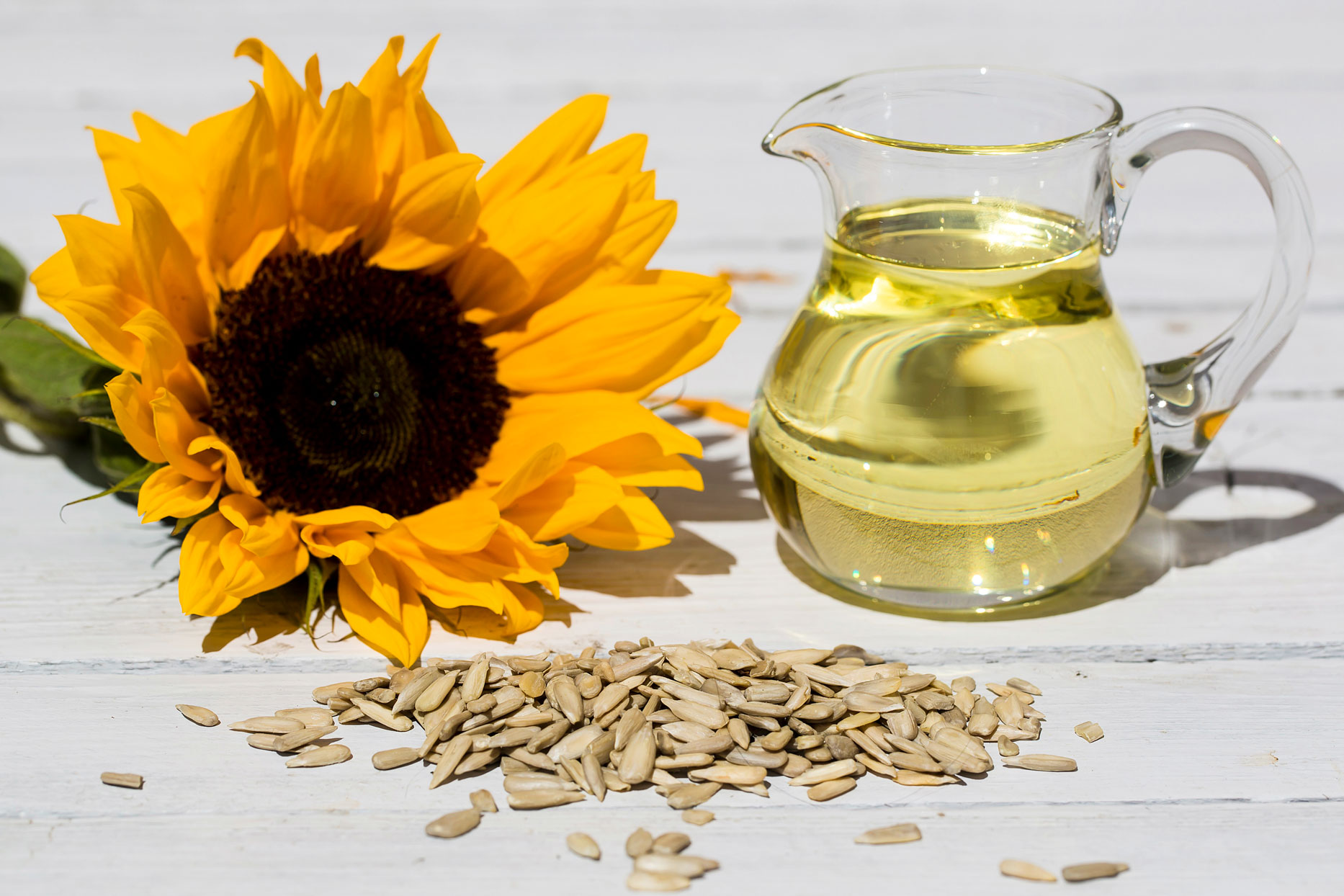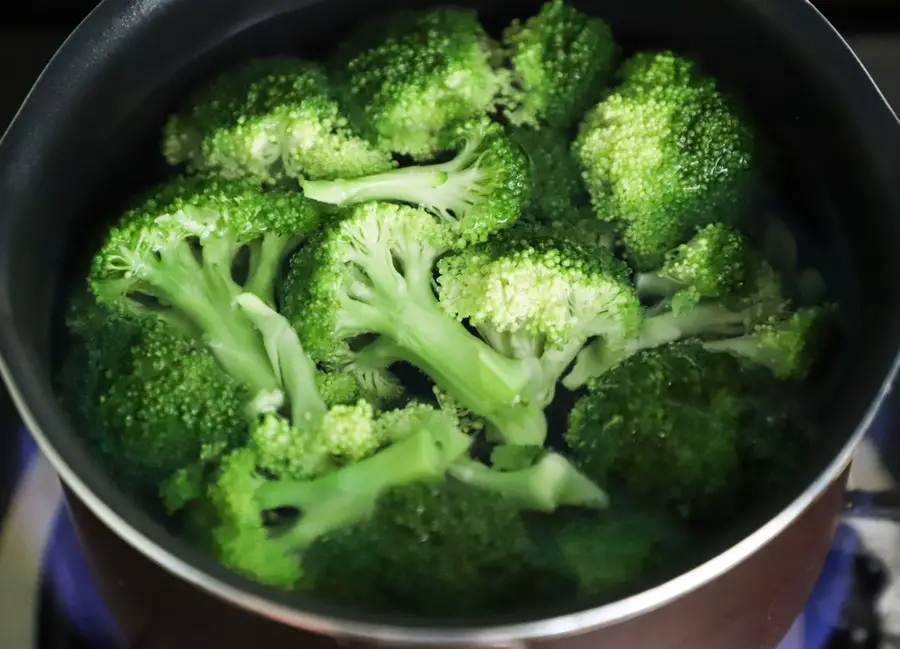Why should you replace sunflower oil despite knowing that it is healthy?
The answer could be-
- Sunflower oil contains the risk of aldehyde if heated for cooking [1]. Aldehyde is responsible for heart disease and lung cancer [2].
- Sunflower oil may be much less flavored, but substitute oils are healthier and safer to heat for cooking. And their flavors don’t spoil the taste.
- Substitute edible oils can make you fry or bake foods that sunflower oil cannot.
It is your responsibility to choose among the edible oils wisely. For example, sunflower oil has some nutritional qualities, but it may also cause some adverse effects on your health.
Opting for substitutes for sunflower oil will prove both bright and healthy for you and your family.
Continue reading this article as we will explore 12 functional substitutes for sunflower oil.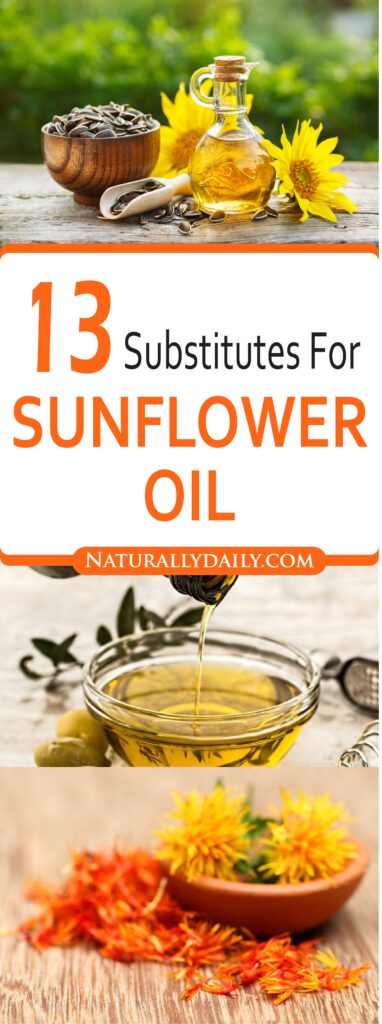
Substitutes for Sunflower Oil
You don’t have to go far to find some alternatives for sunflower oil. You can find several substitute oils in your nearby stores, or you can even order them online. Let’s see more about them in the following:
1. Vegetable Oil
The regular term for vegetable oil is “Soybean Oil,” but nowadays, it can be a blend of various oils such as corn oil, sunflower oil, or grains, plants, and seeds.
Vegetable oil is a popular choice for cooking as it can be used for frying and baking. In addition, it has a neutral flavor that doesn’t spoil the food taste much.
Since it may contain aldehydes mixed with sunflower oil, it is best to pat the food dry with a napkin or kitchen towel after frying.
Reusing vegetable oil after cooking once is not recommended because doing so will risk your body with several ailments
2. Safflower Oil
Safflower oil could be the right choice as a substitute for sunflower oil in the required recipe.
Safflower oil is helpful for baking since it is less flavored oil.
You should follow the same precaution for frying with safflower oil regarding vegetable oil.
3. Olive Oil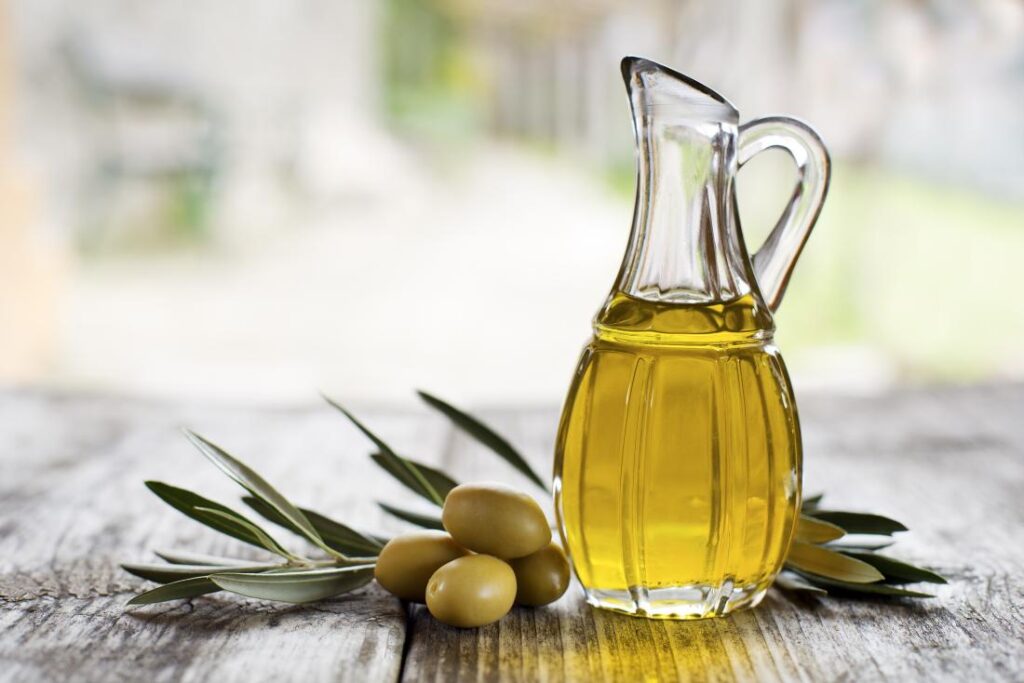
You should use the more processed olive oil if you want to use it in cooking. Olive oil, especially virgin or extra-virgin, is more robust in flavor, which may not be suitable for your food’s taste.
You can find olive oil best in low-temperature cooking.
Pure olive oil can be used for dressing or marinating meat and fish. In addition, people love to eat fresh bread by dipping the bread in olive oil.
Olive oil is healthy as it can nourish your skin, and its antioxidant can alleviate diabetic complications [3].
4. Walnut Oil
Walnut oil is not mainly a cooking oil, but this could be a substitute you can use for sunflower oil.
You can use walnut oil for dressing salads and making walnut bread.
You better use walnut oil as finishing oil or in chilled desserts as it may turn bitter if you heat it.
Walnut oil contains antioxidants and omega-3 fatty acids, which are beneficial for health [4].
Walnut oil lasts shortly at room temperature and liquefies, so you may need to replace it more often.
5. Butter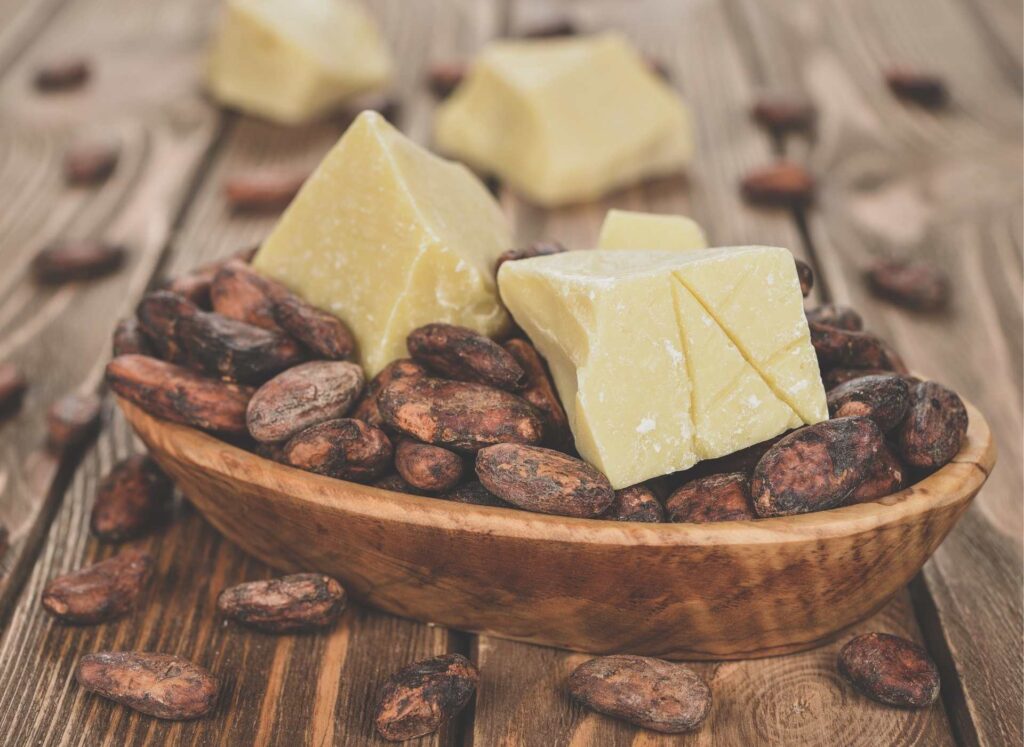
It would help if you preferred butter over sunflower or any other cooking oil for baking like cakes and cookies.
You may use butter for cooking, but you should be careful about its amount.
Butter contains vitamins A, E, and K, which are suitable for your health [5].
You should be careful in using butter as its richness of saturated fat is said to be bad for the heart [6].
6. Peanut Oil
Peanut oil is an excellent choice for cooking as it doesn’t steal the taste of your food. It is good for frying but not suitable for baking.
With a sweet and nutty flavor and aroma, peanut oil can give your food a munchy taste.
Peanut oil is supposed to be healthier if cold-pressed. It is rich in vitamin E and good for your heart.
You may want to be careful when using peanut oil as it contains omega-6. Overconsumption of omega-6 can be harmful to health [7].
7. Corn Oil
Corn oil is good for baking as it gives a mild flavor to the food. In addition, it contains healthy saturated fat and antioxidants, which are beneficial for the heart.
You should use corn oil in a small amount as it is also rich in calories. It might be a valuable substitute for sunflower oil, but it also holds the risk of aldehyde if heated highly.
8. Avocado Oil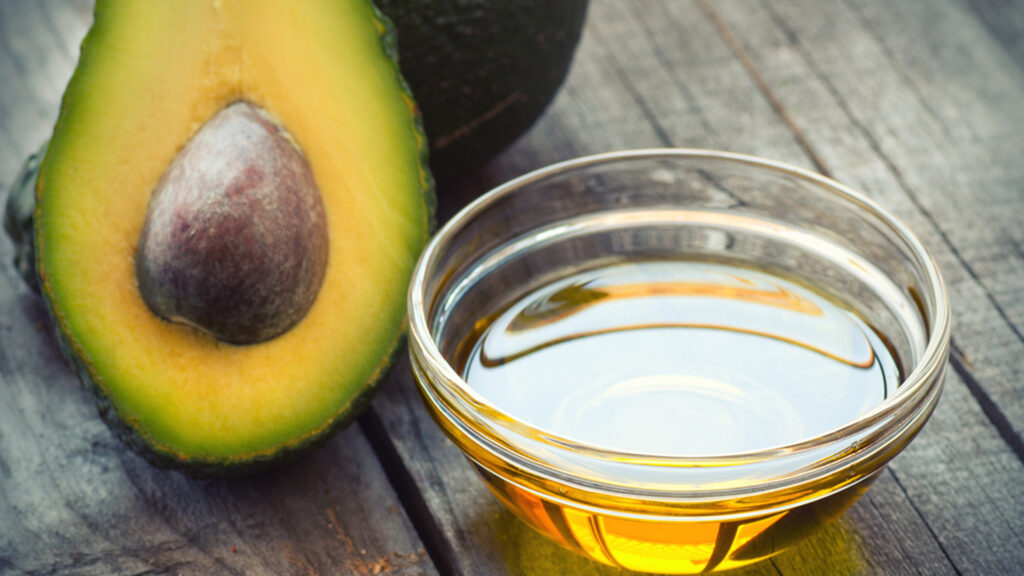
Avocado oil is better and healthier than sunflower oil for grilling and roasting.
Avocado oil has a nice grassy flavor that adds a pleasant taste to the food.
Avocado oil is rich in oleic acid and can lower blood pressure [8, 9].
9. Flaxseed Oil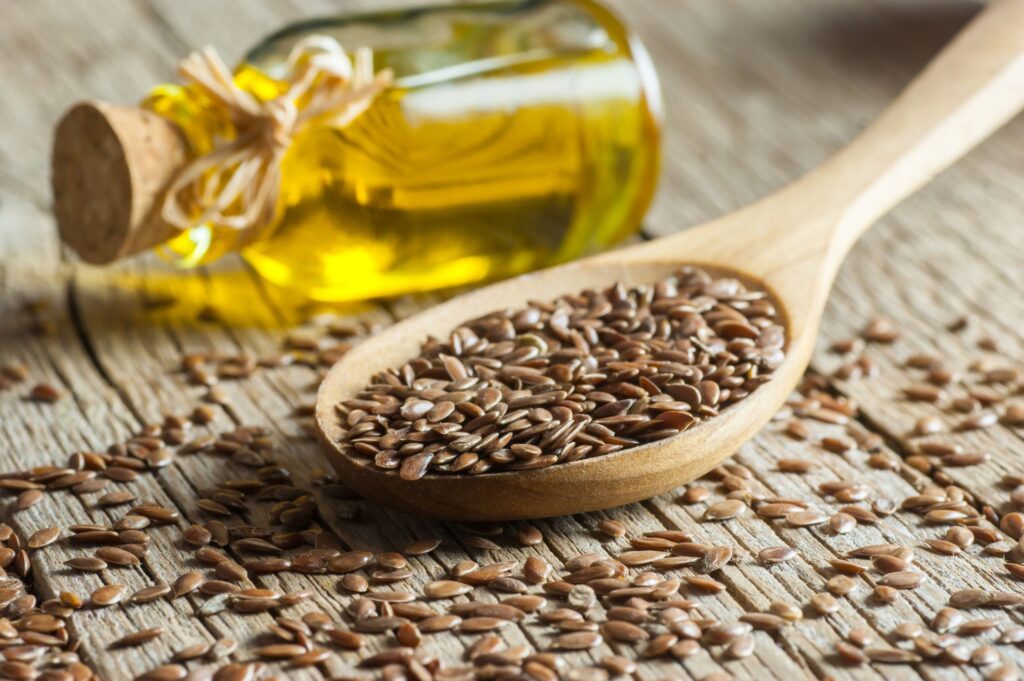
Flaxseed oil is also known as linseed oil. You should look for flaxseed oil if you want to cook with it at a lower temperature.
Flaxseed or linseed oil is ideal for dressing salads.
Flaxseed oil should not take the place of sunflower oil when low-heated frying. You can go for this oil only if no other substitutes are available.
10. Grapeseed Oil
Extracted from the seeds of the grape, Grapeseed oil has a nutty flavor and is suitable for frying. Grapeseed oil can act as an effective alternative to sunflower oil.
Grapeseed oil is high in polyunsaturated fat and vitamin E; you should use this oil sparingly.
You may want to be careful with this oil as not much research has been conducted on this oil’s health benefits and risks.
11. Coconut Oil
Coconut oil is an excellent substitute for sunflower oil in baking. In addition, it is a low-calorie replacement for various other cooking oils.
There are two types of coconut oil; refined and unrefined. Refined coconut oil is best for baking, while crude coconut oil is suitable for frying.
Coconut oil is rich in antioxidants [10]. You can track the necessity for butter in your recipe by adding coconut oil to it. Coconut oil is an excellent choice for cold desserts.
12. Canola Oil
Canola oil is a safer substitute for sunflower oil as it produces aldehydes in a low amount if heated.
Canola oil is less-flavored and popular in baking cakes and cookies. But you may also use it for dressing salads and grilling.
You may find good omega-3 fatty acids in canola oil.
Final Word
Cooking oil is a vital ingredient in daily life. However, considering its nutrient benefits and adverse health impacts, you should choose it carefully.
Sunflower oil is popularly used in many houses, but its alternative ones are also promising and helpful.
You should consult your doctor or health expert about using each oil mentioned above because they are more or less high in unsaturated fat, omega-3, or omega-6 fatty acids.
Lastly, check the label of the bottle you buy from stores to know its components. You may also go with some oil-free recipes if sunflower or any of the mentioned oils are unavailable or restricted in your diet.
